Author Photo
By Samiha Ahmed
Work
I entered the glass building.
The scarcity of estrogen on my floor intimidated me, walking to my desk every day.
The men in the offices treat us as naïve and shy, shocked when we open our mouths at meetings.
Men lounge around, talking and talking as if their tongues drip with words that are equivalent to the value of gold.
They say that women fail to move up the scales after college. Maybe it’s because the men left us with the stairs as a hand-me-down, while they took the elevators instead.
Neighborhood
The people in my neighborhood are surveillance cameras.
The women walking to the grocery store, the boys heading to the park, the men exiting the mosques, the elders sitting in the backyards, the girls returning home from the train station, and the kids riding their bikes around the neighborhood.
One movement, one action, one word out of place and it gets jotted down, recorded for later review.
Reports and summaries later sent out to the families and acquaintances of the criminal.
Events
We are getting ready for a dinner.
Be careful with what you say or do.
My mother says to me, like its routine. The words inBanglapaired with her warning eyes are delivered to my head as junk mail that I’ve gotten into the habit of discarding.
Tea parties, Eid parties, dinner parties, just-because parties.Women and girls mandated by social law to be present, while men fulfill their yearly quota of family events by appearing in the family eye once.
While we stand around the room with our drinks in hand, nervous laughter erupts from the empty shell of the woman standing beside me as she pretends that the bullet of the gun of judgement just shot at her didn’t hit the upper left part of her chest but flew over her head instead. Because there’s no reason to falter, no reason to take anything to heart. After all, we’re all “sisters,”right?
Home
Our internal alarms wake us up.
Breakfast was made and consumed.The beds have been made.The laundry is done.The clothes have been folded and put away. The tables and dressers have been dusted.The floor has been swept clean. Lunch is cooking on the stove.
It is now eleven o’clock in the morning.
And the three males of the house are nowhere to be seen. They lack the alarms that were programmed into our DNA from generations past, so they snooze without having to hit snooze.
Our responsibilities seem to increase exponentially with age, while our freedoms seem to erode daily.
This is what we fell into.
That’s why we take the stairs two at a time, we destroy the surveillance cameras, confiscate all the guns aimed at us, shut off all your alarms, and we speak.
We speak up for ourselves, for those that came before us, and for those that will come after. That is how we get out.
Samiha Ahmed (she/her/hers) is a confident, productive, coffee-obsessed, brown woman from NYC trying to learn more about the world. She enjoys writing and reading short stories, autobiographical pieces, and poetry. She writes to shed light on the experiences of brown/Muslim women and hopes to empower and lead women in her community. Her writing has been published by Axis of Logic and Changing Womxn Collective.


